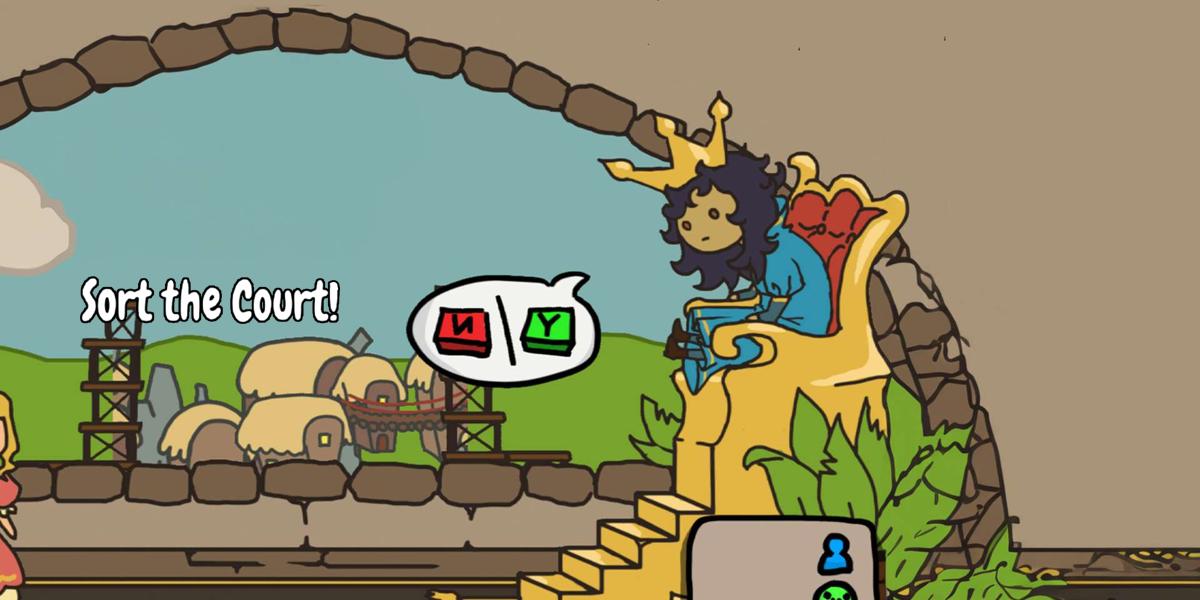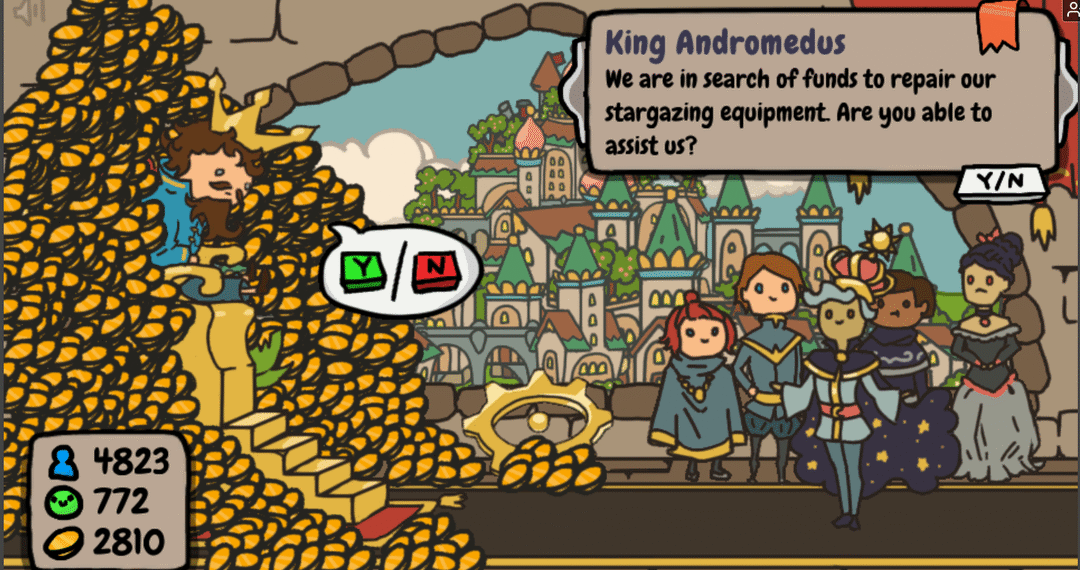There are games that impress us with graphics, others that captivate us with action, and then there are those rare gems that grip us through simplicity and storytelling. Sort the Court is one of them.
It’s a deceptively simple indie game that transforms a small medieval kingdom into a theater of moral choices, humor, and human emotion — all through a handful of “Yes” or “No” decisions.
At first glance, it looks minimalistic. But beneath that charming, hand-drawn art style lies a powerful experience that explores leadership, ethics, and empathy in the most unexpected ways.
The Origins of a Cult Indie Game
Before diving into gameplay, it’s worth understanding where Sort the Court came from.
The game was developed by Graeme Borland, a Canadian indie developer known for creating whimsical and emotionally resonant small projects. Built during a game jam — a rapid development competition — the concept of Sort the Court emerged from a simple question:
What if ruling a kingdom was reduced to “Yes” or “No” decisions?
The idea took off. Players quickly fell in love with the minimalist premise and the clever writing that turned what could’ve been a shallow concept into something meaningful.
Unlike complex simulation games or heavy strategy titles, this game thrives on its intimacy. Every character feels personal, every decision carries weight, and your kingdom’s fate rests entirely in the balance of your intuition.
Sort the Court – The Power of Simplicity in Choice
At its core, sort the court revolves around one brilliant mechanic: decision-making. You play as a monarch — king or queen, depending on your choice at the start — who must rule the kingdom through simple binary decisions.
Characters, both human and magical, come to your court daily seeking your judgment. You can only answer “Yes” or “No.” And yet, this simple choice ripples through your city like a wave.
One day, a friendly knight might ask for funds to go on a quest. Do you risk your gold to gain honor and fame? The next day, a mischievous demon might offer you wealth in exchange for a few of your citizens’ souls. Do you accept and risk your people’s trust?
These moments define your reign. Each choice feels small, but collectively, they shape a living, breathing kingdom — one where prosperity or ruin comes not through combat, but through consequence.

The Art of Consequence
In Sort the Court, there is no “restart” button for bad decisions.
If you anger a wizard, he might curse your land. If you reject your townspeople too often, morale plummets.
The game cleverly teaches responsibility through repetition — you must live with your choices.
Yet what makes it beautiful is how it never feels punishing. Even when your city crumbles, you understand why. The lessons aren’t about loss, but about growth.
It mirrors the human condition: we make quick decisions every day, often with limited information. Sometimes we help others at our own expense. Sometimes we choose safety over risk.
Sort the Court distills this very human dilemma into a charming, animated allegory.
The Characters – Heartbeats of the Kingdom
What truly brings the game to life are the eccentric characters that visit your throne room. Each one has a distinct personality, voice, and purpose.
There’s the loyal Knight, always eager to defend the kingdom; the sweet Grandma, who bakes cookies and offers wisdom; the eerie Sneaky Girl, who tempts you into shady deals; and even a little cat that just wants to be petted.
Then there are supernatural guests — wizards, spirits, and monsters — who push your moral compass to its limit.
A vampire might promise riches if you turn a blind eye. A giant might offer peace in exchange for tribute.
Through these encounters, your leadership evolves — not through numbers and stats, but through emotional intuition.
Every visit becomes a story. And every story becomes part of your reign’s legacy.
The Magic of Sound and Atmosphere
For a game so visually simple, Sort the Court excels in its ambience.
The soundtrack is light and playful but carries an undertone of melancholy — a reminder that leadership is as lonely as it is powerful.
Sound cues signal success or loss: a triumphant chime when your decision benefits the city, a somber tone when morale drops.
The background slowly evolves as your kingdom grows: buildings rise, flags wave, and citizens cheer. These subtle changes create an emotional connection between your actions and the world you’re shaping.
You don’t just watch your kingdom evolve — you feel it.
The Psychology Behind the Game
Part of what makes Sort the Court so fascinating is how it taps into human psychology.
By reducing decision-making to “Yes” or “No,” it exposes how easily our values can shift depending on mood, temptation, or fatigue.
Do you stay true to your principles after days of hard rulership? Or do you take the easy path for quick rewards?
The beauty of the design lies in how it quietly studies your ethical consistency.
In just a few minutes, players find themselves reflecting:
- Why did I say yes to that shady deal?
- Why did I deny that beggar help?
- Why did I risk my people’s happiness for profit?
The game doesn’t scold you — it observes you. And in doing so, it makes you aware of your own moral compass.
Beyond the Kingdom – A Reflection of Leadership
Leadership is a recurring theme in modern games, but few titles capture it with the emotional depth of Sort the Court.
While strategy games often focus on expansion, conquest, and management, this one focuses on the emotional burden of authority.
Every “Yes” and “No” feels personal. The lack of middle ground forces you to commit.
There’s no “maybe,” no “let me think.” Just instinct.
This mechanic brilliantly mirrors real-world leadership, where hesitation can cost lives and indecision breeds chaos.
By stripping away complexity, the game reveals the essence of governance — the weight of responsibility.
The Story Beneath the Choices
Although Sort the Court never delivers a grand cinematic narrative, it tells countless micro-stories that together form a cohesive arc.
As your kingdom prospers, new events unfold — festivals, invasions, mysterious visitors, and diplomatic missions.
If you play long enough, alliances can form, peace can be achieved, and prosperity can reign.
But even in success, there’s a lingering thought: At what cost?
Did you gain wealth by harming others?
Did you bring peace by compromising your ethics?
Did you rule with kindness or fear?
These subtle questions make Sort the Court more than entertainment — it’s a mirror to your decision-making style.
Replayability – The Crown Never Fits the Same Way Twice
One of the most endearing aspects of Sort the Court is its replay value.
No two reigns ever feel the same. Because outcomes depend entirely on your sequence of “Yes” or “No,” each playthrough tells a different story.
Perhaps in one game you’re a benevolent monarch loved by your people; in another, a tyrant feared by all.
Some players aim to maximize prosperity, while others simply enjoy seeing how wild or dark the outcomes can become.
This flexibility keeps the game fresh and engaging long after your first session. It’s the digital equivalent of sitting on a throne — and wondering what kind of ruler you’ll be today.
The Hidden Lessons of Morality and Empathy
Beneath its cartoonish charm, Sort the Court offers lessons in empathy and perspective.
It reminds players that every decision affects someone else, even when it seems small.
Helping a villager might lower your gold, but it raises morale. Rejecting a deal might slow progress, but it preserves integrity.
In this way, the game becomes an allegory for real-world choices — whether in leadership, business, or personal life.
It’s not about perfect management; it’s about intent.
The game whispers a quiet truth:
“Kindness is a strategy, too.”
Why Sort the Court Endures
Years after its release, Sort the Court continues to attract players across platforms.
Its simplicity, humor, and warmth make it endlessly replayable. Streamers and content creators often revisit it, not for its mechanics, but for the emotional connection it evokes.
Unlike many indie games that fade quickly, this one endures because it captures something universal — the desire to be understood as a leader.
Players aren’t just managing a kingdom; they’re exploring who they are when given power.
That’s why people still talk about it. That’s why it lingers.
The Legacy of an Indie Classic
When Sort the Court first appeared, few expected it to become a cultural reference point. Yet it did.
It’s now cited as a model for how minimalist design can deliver maximum impact.
With no battles, no 3D environments, and no dialogue trees, it still manages to create drama, comedy, and emotion.
Its influence can be seen in newer decision-based games that focus on ethics and emotional storytelling.
It showed that simplicity is not limitation — it’s clarity.
The Deceptive Depth of “Yes” and “No”
What keeps players returning isn’t the art style or humor alone — it’s the moral depth hidden in two buttons.
When you strip away options, every choice gains meaning.
You can’t deflect or rationalize — you must decide.
And that’s what makes Sort the Court brilliant. It’s a minimalist experiment that reveals how our personalities emerge under constraint.
We all want to believe we’d be fair, kind, and wise as rulers.
But this game dares to ask: Would you really?
The Heart Behind Sort the Court
Beyond its design, the heart of sort the court lies in empathy.
It doesn’t judge, but it gently nudges players to consider the people behind their decisions.
A single “Yes” can save a family; a careless “No” can plunge your city into despair.
That human connection — the realization that power is responsibility — transforms a simple indie game into a quiet masterpiece.
It’s not about winning; it’s about understanding what your choices reveal about you.
Lessons Beyond the Throne
The beauty of Sort the Court is how easily its lessons translate to real life.
In relationships, business, or leadership, we face “Yes or No” moments every day.
We may not wear crowns, but we all make judgments that shape our small kingdoms — our families, workplaces, and communities.
The game subtly teaches:
- Compassion is strength.
- Listening is leadership.
- Every choice builds or breaks trust.
Perhaps that’s why players remember it long after the screen fades — because its lessons apply long after the game ends.
Conclusion
In the end, Sort the Court isn’t just a game about ruling a kingdom; it’s a reflection on what it means to rule ourselves.
Through laughter, mistakes, and tiny triumphs, it reveals that power isn’t defined by dominance, but by decisions rooted in empathy.
The throne may be virtual, but the lessons are very real.
We are all monarchs in our own small realms — shaping our worlds, one “Yes” or “No” at a time.
That’s the quiet brilliance of Sort the Court:
It reminds us that even the simplest choices can define an entire kingdom — and an entire soul.
FAQs
What is Sort the Court about?
Sort the Court is an indie decision-making game where players rule a medieval kingdom as a king or queen. You respond to your citizens’ requests with “Yes” or “No,” and your choices affect the happiness, wealth, and population of your realm.
Who created Sort the Court?
The game was developed by Graeme Borland, a Canadian indie developer known for creating emotionally rich, minimalist games. He originally built Sort the Court during a game jam, where developers create a game within a limited time frame.
Why is Sort the Court so popular?
Players love Sort the Court because of its simplicity and depth. Despite having only two response options, the game captures the emotional complexity of leadership, morality, and empathy. Each decision feels personal and meaningful, which keeps players engaged.
What makes Sort the Court different from other decision games?
Unlike most decision-based or simulation games that rely on complex mechanics, Sort the Court distills everything down to two choices — “Yes” or “No.” This design reveals how even the smallest actions can have big consequences and teaches players about responsibility in leadership.
What lessons can you learn from Sort the Court?
Sort the Court teaches the importance of empathy, integrity, and accountability. It reminds players that power isn’t about control, but about compassion — and that every decision, no matter how small, shapes the world around us.
Also read :Mass Effect 2 – A Masterpiece of Science Fiction Storytelling















